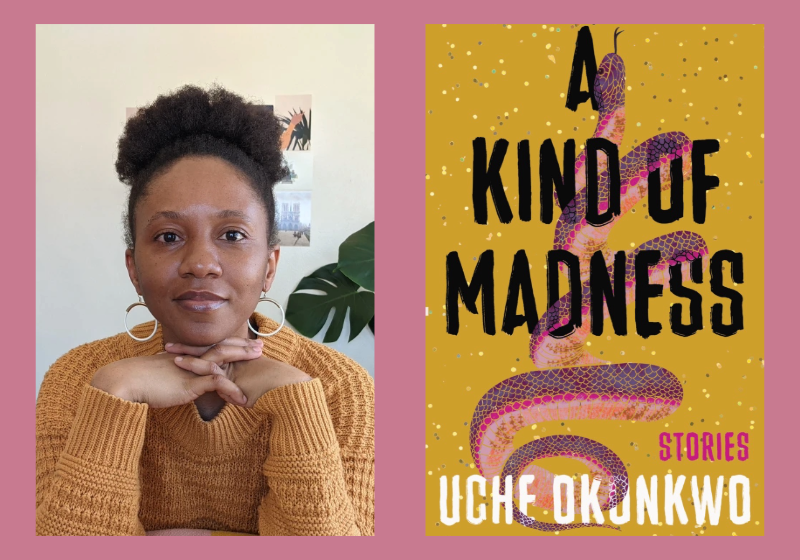
On May 1st at our Literary Debutante Ball, One Story will be celebrating four of our authors who have recently published or will soon publish their debut books. In the weeks leading up to the Ball, we’ll be introducing our Debs through a series of interviews.
Today, we’re talking to Uche Okonkwo, author of One Story Issue #248, “Our Belgian Wife” and the short story collection A Kind of Madness (Tin House Books).
A Kind of Madness is a collection of ten short stories set in contemporary Nigeria that navigate the human spirit’s ability to endure, adapt, and find moments of grace amidst adversity. Uche Okonkwo’s cast of indelible characters face challenges with resilience and vulnerability. Okonkwo’s writing is both lyrical and direct, capturing the nuances of emotion with honesty and compassion. A Kind of Madness invites us to confront our own biases, question societal norms, and ultimately recognize our humanity. In this interview, Okonkwo discusses her process bringing this collection together, and what excites her in reading, writing, and fashion!
—Michaeljulius Idani
MI: Can you walk us through the moment when you learned A Kind of Madness would be published? Who was the first person you shared the news with and how did you celebrate?
UO: I was at the 2023 AWP conference when I first got the news that Tin House had made an offer on A Kind of Madness. It felt surreal. I don’t remember who exactly I first told about it, but it was most likely my friends from UNL who were also at AWP.
MI: The poet Cesar Cruz said that art should “comfort the disturbed, and disturb the comfortable.” Your collection does just that for the reader, taking us on journeys that are disorientating and familiar, claustrophobic and expansive. How challenging was the process to render such exquisite characters, find balance and meaning, and create art?
UO: I would say the stories in the collection were challenging to varying degrees or were challenging in their own unique ways. Some were challenging in terms of subject matter; for others it took a long time for me to figure out what certain characters wanted, what was driving them. Each story is its own little world with its difficulties and dramas.
MI: How did “madness” emerge as an organizing principle for this collection? What was the experience of venturing into “madness” while writing these stories?
UO: Madness was never an organizing principle for the stories while I was writing them. The stories in the collection were written over a long period of time—about a decade—and I didn’t start out writing them to be put together in a collection. It got to a point where I had all these stories and so it made sense to publish them as a collection. The idea of “madness” came late in the process, when I was thinking about a title for the book, and it worked for me because all the stories in the collection have to do with some kind of flawed thinking. Some of the stories deal with literal madness, but for most, the madness is more figurative.
MI: What did you learn about yourself while writing this collection?
UO: The stories in this collection were written over a long period of time, so it’s hard to say that I learned any one thing in writing them—I didn’t set out writing each story in the collection with the end goal of making them into a book. However, I would say that the process of putting all the stories together made me more conscious of my writerly tics, of images and turns of phrase that I enjoy and repeat from story to story. I did not notice such things while writing the individual stories because the process of writing them and getting them published in literary journals and magazines was so spread out over time. But when I put all the stories together and read them side by side, my writerly tics and crutches became more obvious. Part of the process of revising and editing these stories as a collection was finding and revising those tics.
MI: What do you hope readers take away from reading this collection?
UO: I think it’s out of my hands what readers take away from the collection. Part of the process of writing, for me, is learning to sit with unanswered, and perhaps unanswerable, questions. It’s a thing of joy to have readers sit with me in that space, even if only for a while.
MI: In your One Story Interview for “Our Belgian Wife” (Issue #248), you discussed being a Nigerian writer and how cultural influences fuel your imagination. Along with one of your fellow debutantes, there are several Nigerian writers debuting this year. What excites you about the rise of Nigerian literature?
UO: Having more books to read is always exciting. I look forward to seeing how the diversity of Nigerian experiences—within Nigeria and out in the wider world—is being/will be represented in literature.
MI: Lastly, what are you most looking forward to at the One Story ball?
UO: Seeing all the outfits, especially ’Pemi Aguda’s!
Michaeljulius Y. Idani is an Atlanta-based writer of fictions.